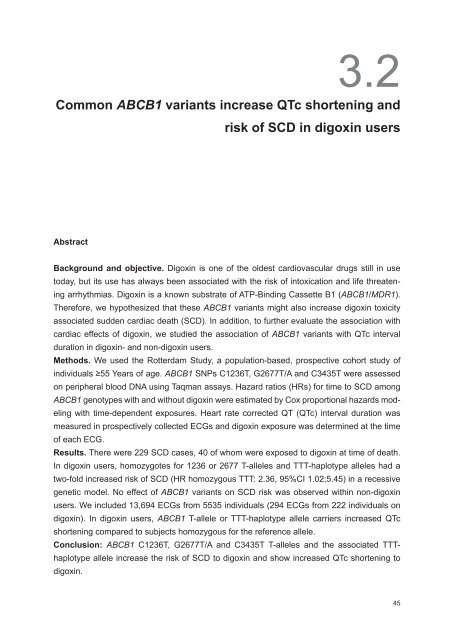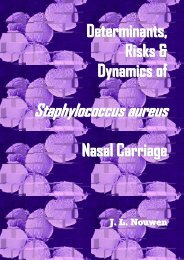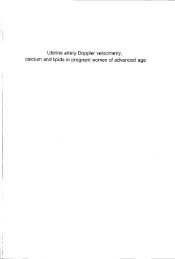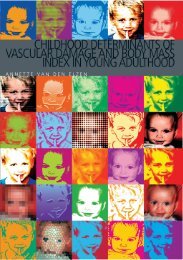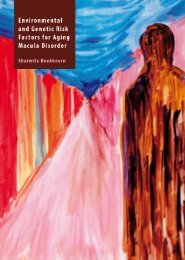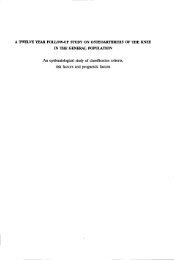Genetic susceptibility to adverse drug effects - Epidemiology ...
Genetic susceptibility to adverse drug effects - Epidemiology ...
Genetic susceptibility to adverse drug effects - Epidemiology ...
Create successful ePaper yourself
Turn your PDF publications into a flip-book with our unique Google optimized e-Paper software.
3.2<br />
Common ABCB1 variants increase QTc shortening and<br />
risk of SCD in digoxin users<br />
Abstract<br />
Background and objective. Digoxin is one of the oldest cardiovascular <strong>drug</strong>s still in use<br />
<strong>to</strong>day, but its use has always been associated with the risk of in<strong>to</strong>xication and life threatening<br />
arrhythmias. Digoxin is a known substrate of ATP-Binding Cassette B1 (ABCB1/MDR1).<br />
Therefore, we hypothesized that these ABCB1 variants might also increase digoxin <strong>to</strong>xicity<br />
associated sudden cardiac death (SCD). In addition, <strong>to</strong> further evaluate the association with<br />
cardiac <strong>effects</strong> of digoxin, we studied the association of ABCB1 variants with QTc interval<br />
duration in digoxin- and non-digoxin users.<br />
Methods. We used the Rotterdam Study, a population-based, prospective cohort study of<br />
individuals ≥55 Years of age. ABCB1 SNPs C1236T, G2677T/A and C3435T were assessed<br />
on peripheral blood DNA using Taqman assays. Hazard ratios (HRs) for time <strong>to</strong> SCD among<br />
ABCB1 genotypes with and without digoxin were estimated by Cox proportional hazards modeling<br />
with time-dependent exposures. Heart rate corrected QT (QTc) interval duration was<br />
measured in prospectively collected ECGs and digoxin exposure was determined at the time<br />
of each ECG.<br />
Results. There were 229 SCD cases, 40 of whom were exposed <strong>to</strong> digoxin at time of death.<br />
In digoxin users, homozygotes for 1236 or 2677 T-alleles and TTT-haplotype alleles had a<br />
two-fold increased risk of SCD (HR homozygous TTT: 2.36, 95%CI 1.02;5.45) in a recessive<br />
genetic model. No effect of ABCB1 variants on SCD risk was observed within non-digoxin<br />
users. We included 13,694 ECGs from 5535 individuals (294 ECGs from 222 individuals on<br />
digoxin). In digoxin users, ABCB1 T-allele or TTT-haplotype allele carriers increased QTc<br />
shortening compared <strong>to</strong> subjects homozygous for the reference allele.<br />
Conclusion: ABCB1 C1236T, G2677T/A and C3435T T-alleles and the associated TTThaplotype<br />
allele increase the risk of SCD <strong>to</strong> digoxin and show increased QTc shortening <strong>to</strong><br />
digoxin.<br />
45


